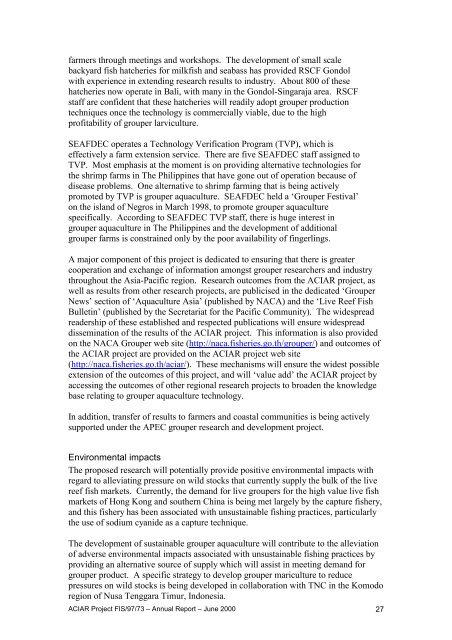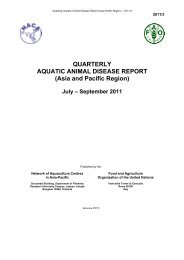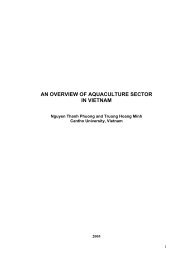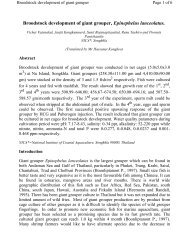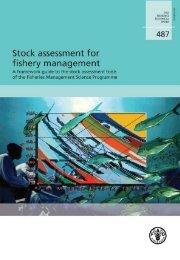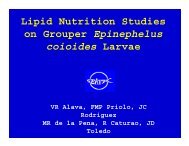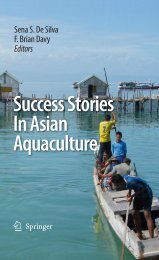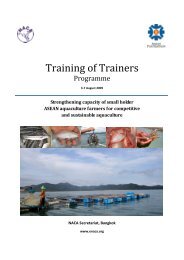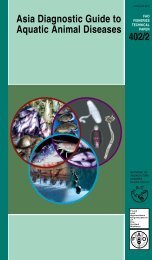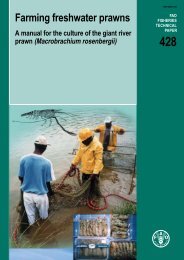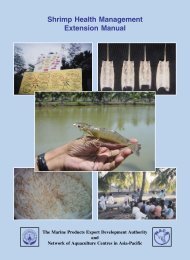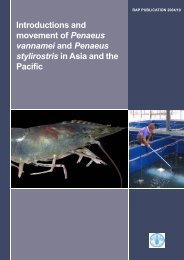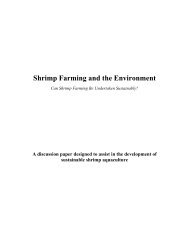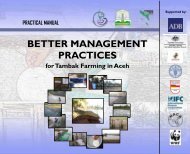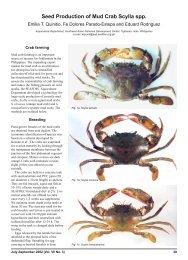ACIAR Project FIS/97/73 - Library - Network of Aquaculture Centres ...
ACIAR Project FIS/97/73 - Library - Network of Aquaculture Centres ...
ACIAR Project FIS/97/73 - Library - Network of Aquaculture Centres ...
Create successful ePaper yourself
Turn your PDF publications into a flip-book with our unique Google optimized e-Paper software.
farmers through meetings and workshops. The development <strong>of</strong> small scalebackyard fish hatcheries for milkfish and seabass has provided RSCF Gondolwith experience in extending research results to industry. About 800 <strong>of</strong> thesehatcheries now operate in Bali, with many in the Gondol-Singaraja area. RSCFstaff are confident that these hatcheries will readily adopt grouper productiontechniques once the technology is commercially viable, due to the highpr<strong>of</strong>itability <strong>of</strong> grouper larviculture.SEAFDEC operates a Technology Verification Program (TVP), which iseffectively a farm extension service. There are five SEAFDEC staff assigned toTVP. Most emphasis at the moment is on providing alternative technologies forthe shrimp farms in The Philippines that have gone out <strong>of</strong> operation because <strong>of</strong>disease problems. One alternative to shrimp farming that is being activelypromoted by TVP is grouper aquaculture. SEAFDEC held a ‘Grouper Festival’on the island <strong>of</strong> Negros in March 1998, to promote grouper aquaculturespecifically. According to SEAFDEC TVP staff, there is huge interest ingrouper aquaculture in The Philippines and the development <strong>of</strong> additionalgrouper farms is constrained only by the poor availability <strong>of</strong> fingerlings.A major component <strong>of</strong> this project is dedicated to ensuring that there is greatercooperation and exchange <strong>of</strong> information amongst grouper researchers and industrythroughout the Asia-Pacific region. Research outcomes from the <strong>ACIAR</strong> project, aswell as results from other research projects, are publicised in the dedicated ‘GrouperNews’ section <strong>of</strong> ‘<strong>Aquaculture</strong> Asia’ (published by NACA) and the ‘Live Reef FishBulletin’ (published by the Secretariat for the Pacific Community). The widespreadreadership <strong>of</strong> these established and respected publications will ensure widespreaddissemination <strong>of</strong> the results <strong>of</strong> the <strong>ACIAR</strong> project. This information is also providedon the NACA Grouper web site (http://naca.fisheries.go.th/grouper/) and outcomes <strong>of</strong>the <strong>ACIAR</strong> project are provided on the <strong>ACIAR</strong> project web site(http://naca.fisheries.go.th/aciar/). These mechanisms will ensure the widest possibleextension <strong>of</strong> the outcomes <strong>of</strong> this project, and will ‘value add’ the <strong>ACIAR</strong> project byaccessing the outcomes <strong>of</strong> other regional research projects to broaden the knowledgebase relating to grouper aquaculture technology.In addition, transfer <strong>of</strong> results to farmers and coastal communities is being activelysupported under the APEC grouper research and development project.Environmental impactsThe proposed research will potentially provide positive environmental impacts withregard to alleviating pressure on wild stocks that currently supply the bulk <strong>of</strong> the livereef fish markets. Currently, the demand for live groupers for the high value live fishmarkets <strong>of</strong> Hong Kong and southern China is being met largely by the capture fishery,and this fishery has been associated with unsustainable fishing practices, particularlythe use <strong>of</strong> sodium cyanide as a capture technique.The development <strong>of</strong> sustainable grouper aquaculture will contribute to the alleviation<strong>of</strong> adverse environmental impacts associated with unsustainable fishing practices byproviding an alternative source <strong>of</strong> supply which will assist in meeting demand forgrouper product. A specific strategy to develop grouper mariculture to reducepressures on wild stocks is being developed in collaboration with TNC in the Komodoregion <strong>of</strong> Nusa Tenggara Timur, Indonesia.<strong>ACIAR</strong> <strong>Project</strong> <strong>FIS</strong>/<strong>97</strong>/<strong>73</strong> – Annual Report – June 2000 27


